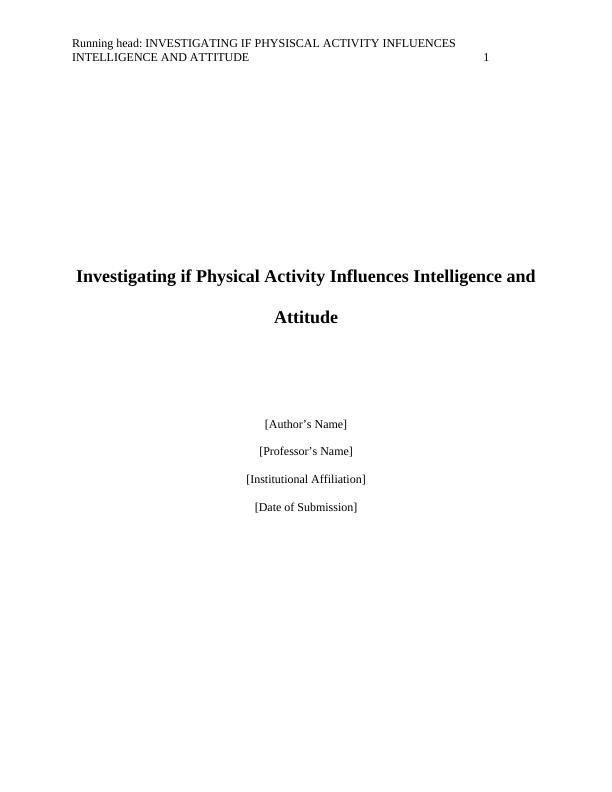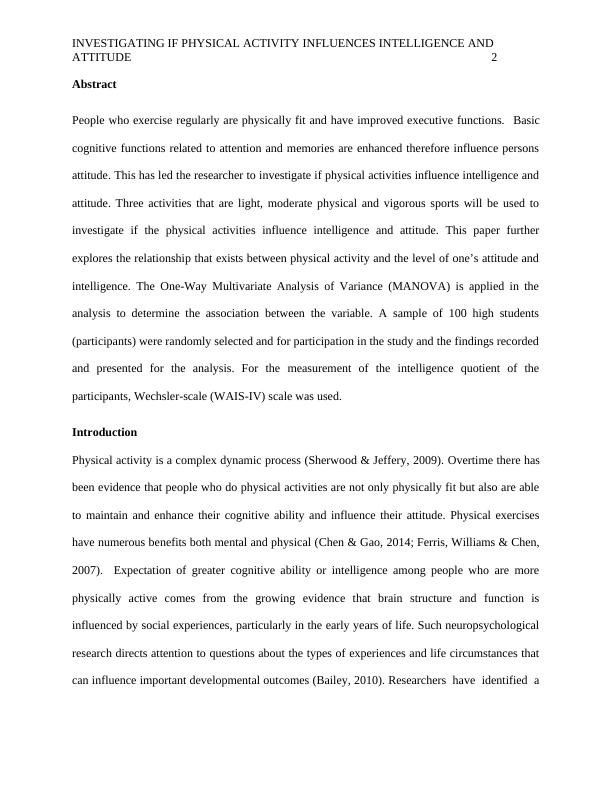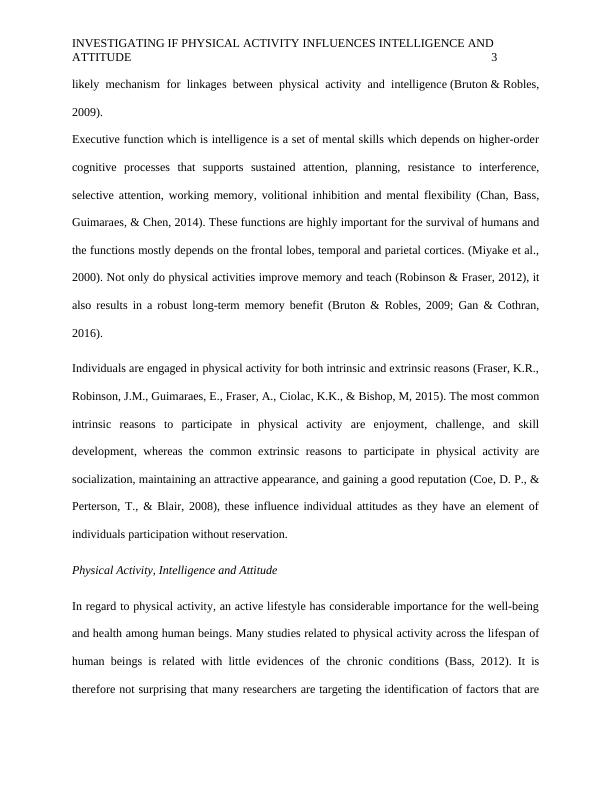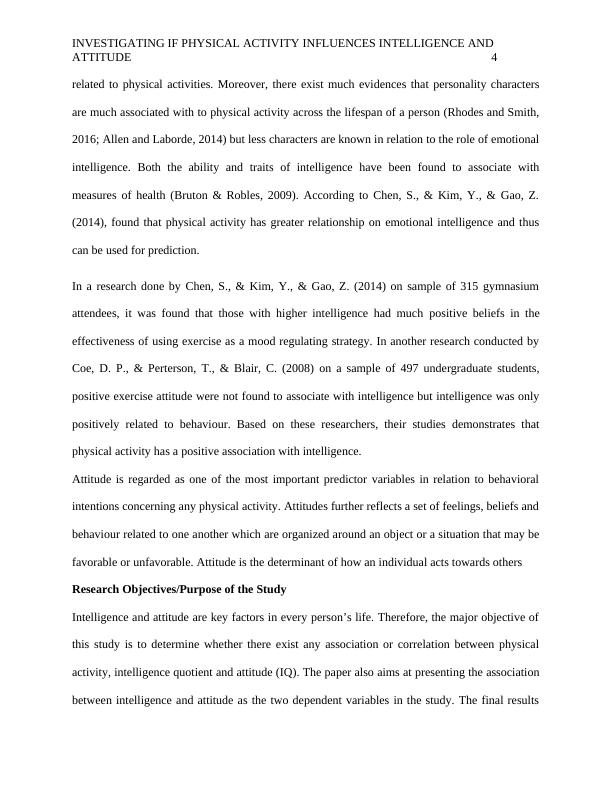Investigating if Physical Activity Influences Intelligence and Attitude
11 Pages2926 Words52 Views
Added on 2023-06-05
About This Document
This study investigates if physical activities influence intelligence and attitude. Three activities that are light, moderate physical and vigorous sports will be used to investigate if the physical activities influence intelligence and attitude. The One-Way Multivariate Analysis of Variance (MANOVA) is applied in the analysis to determine the association between the variable. A sample of 100 high students (participants) were randomly selected and for participation in the study and the findings recorded and presented for the analysis.
Investigating if Physical Activity Influences Intelligence and Attitude
Added on 2023-06-05
ShareRelated Documents
Running head: INVESTIGATING IF PHYSISCAL ACTIVITY INFLUENCES
INTELLIGENCE AND ATTITUDE 1
Investigating if Physical Activity Influences Intelligence and
Attitude
[Author’s Name]
[Professor’s Name]
[Institutional Affiliation]
[Date of Submission]
INTELLIGENCE AND ATTITUDE 1
Investigating if Physical Activity Influences Intelligence and
Attitude
[Author’s Name]
[Professor’s Name]
[Institutional Affiliation]
[Date of Submission]

INVESTIGATING IF PHYSICAL ACTIVITY INFLUENCES INTELLIGENCE AND
ATTITUDE 2
Abstract
People who exercise regularly are physically fit and have improved executive functions. Basic
cognitive functions related to attention and memories are enhanced therefore influence persons
attitude. This has led the researcher to investigate if physical activities influence intelligence and
attitude. Three activities that are light, moderate physical and vigorous sports will be used to
investigate if the physical activities influence intelligence and attitude. This paper further
explores the relationship that exists between physical activity and the level of one’s attitude and
intelligence. The One-Way Multivariate Analysis of Variance (MANOVA) is applied in the
analysis to determine the association between the variable. A sample of 100 high students
(participants) were randomly selected and for participation in the study and the findings recorded
and presented for the analysis. For the measurement of the intelligence quotient of the
participants, Wechsler-scale (WAIS-IV) scale was used.
Introduction
Physical activity is a complex dynamic process (Sherwood & Jeffery, 2009). Overtime there has
been evidence that people who do physical activities are not only physically fit but also are able
to maintain and enhance their cognitive ability and influence their attitude. Physical exercises
have numerous benefits both mental and physical (Chen & Gao, 2014; Ferris, Williams & Chen,
2007). Expectation of greater cognitive ability or intelligence among people who are more
physically active comes from the growing evidence that brain structure and function is
influenced by social experiences, particularly in the early years of life. Such neuropsychological
research directs attention to questions about the types of experiences and life circumstances that
can influence important developmental outcomes (Bailey, 2010). Researchers have identified a
ATTITUDE 2
Abstract
People who exercise regularly are physically fit and have improved executive functions. Basic
cognitive functions related to attention and memories are enhanced therefore influence persons
attitude. This has led the researcher to investigate if physical activities influence intelligence and
attitude. Three activities that are light, moderate physical and vigorous sports will be used to
investigate if the physical activities influence intelligence and attitude. This paper further
explores the relationship that exists between physical activity and the level of one’s attitude and
intelligence. The One-Way Multivariate Analysis of Variance (MANOVA) is applied in the
analysis to determine the association between the variable. A sample of 100 high students
(participants) were randomly selected and for participation in the study and the findings recorded
and presented for the analysis. For the measurement of the intelligence quotient of the
participants, Wechsler-scale (WAIS-IV) scale was used.
Introduction
Physical activity is a complex dynamic process (Sherwood & Jeffery, 2009). Overtime there has
been evidence that people who do physical activities are not only physically fit but also are able
to maintain and enhance their cognitive ability and influence their attitude. Physical exercises
have numerous benefits both mental and physical (Chen & Gao, 2014; Ferris, Williams & Chen,
2007). Expectation of greater cognitive ability or intelligence among people who are more
physically active comes from the growing evidence that brain structure and function is
influenced by social experiences, particularly in the early years of life. Such neuropsychological
research directs attention to questions about the types of experiences and life circumstances that
can influence important developmental outcomes (Bailey, 2010). Researchers have identified a

INVESTIGATING IF PHYSICAL ACTIVITY INFLUENCES INTELLIGENCE AND
ATTITUDE 3
likely mechanism for linkages between physical activity and intelligence (Bruton & Robles,
2009).
Executive function which is intelligence is a set of mental skills which depends on higher-order
cognitive processes that supports sustained attention, planning, resistance to interference,
selective attention, working memory, volitional inhibition and mental flexibility (Chan, Bass,
Guimaraes, & Chen, 2014). These functions are highly important for the survival of humans and
the functions mostly depends on the frontal lobes, temporal and parietal cortices. (Miyake et al.,
2000). Not only do physical activities improve memory and teach (Robinson & Fraser, 2012), it
also results in a robust long-term memory benefit (Bruton & Robles, 2009; Gan & Cothran,
2016).
Individuals are engaged in physical activity for both intrinsic and extrinsic reasons (Fraser, K.R.,
Robinson, J.M., Guimaraes, E., Fraser, A., Ciolac, K.K., & Bishop, M, 2015). The most common
intrinsic reasons to participate in physical activity are enjoyment, challenge, and skill
development, whereas the common extrinsic reasons to participate in physical activity are
socialization, maintaining an attractive appearance, and gaining a good reputation (Coe, D. P., &
Perterson, T., & Blair, 2008), these influence individual attitudes as they have an element of
individuals participation without reservation.
Physical Activity, Intelligence and Attitude
In regard to physical activity, an active lifestyle has considerable importance for the well-being
and health among human beings. Many studies related to physical activity across the lifespan of
human beings is related with little evidences of the chronic conditions (Bass, 2012). It is
therefore not surprising that many researchers are targeting the identification of factors that are
ATTITUDE 3
likely mechanism for linkages between physical activity and intelligence (Bruton & Robles,
2009).
Executive function which is intelligence is a set of mental skills which depends on higher-order
cognitive processes that supports sustained attention, planning, resistance to interference,
selective attention, working memory, volitional inhibition and mental flexibility (Chan, Bass,
Guimaraes, & Chen, 2014). These functions are highly important for the survival of humans and
the functions mostly depends on the frontal lobes, temporal and parietal cortices. (Miyake et al.,
2000). Not only do physical activities improve memory and teach (Robinson & Fraser, 2012), it
also results in a robust long-term memory benefit (Bruton & Robles, 2009; Gan & Cothran,
2016).
Individuals are engaged in physical activity for both intrinsic and extrinsic reasons (Fraser, K.R.,
Robinson, J.M., Guimaraes, E., Fraser, A., Ciolac, K.K., & Bishop, M, 2015). The most common
intrinsic reasons to participate in physical activity are enjoyment, challenge, and skill
development, whereas the common extrinsic reasons to participate in physical activity are
socialization, maintaining an attractive appearance, and gaining a good reputation (Coe, D. P., &
Perterson, T., & Blair, 2008), these influence individual attitudes as they have an element of
individuals participation without reservation.
Physical Activity, Intelligence and Attitude
In regard to physical activity, an active lifestyle has considerable importance for the well-being
and health among human beings. Many studies related to physical activity across the lifespan of
human beings is related with little evidences of the chronic conditions (Bass, 2012). It is
therefore not surprising that many researchers are targeting the identification of factors that are

INVESTIGATING IF PHYSICAL ACTIVITY INFLUENCES INTELLIGENCE AND
ATTITUDE 4
related to physical activities. Moreover, there exist much evidences that personality characters
are much associated with to physical activity across the lifespan of a person (Rhodes and Smith,
2016; Allen and Laborde, 2014) but less characters are known in relation to the role of emotional
intelligence. Both the ability and traits of intelligence have been found to associate with
measures of health (Bruton & Robles, 2009). According to Chen, S., & Kim, Y., & Gao, Z.
(2014), found that physical activity has greater relationship on emotional intelligence and thus
can be used for prediction.
In a research done by Chen, S., & Kim, Y., & Gao, Z. (2014) on sample of 315 gymnasium
attendees, it was found that those with higher intelligence had much positive beliefs in the
effectiveness of using exercise as a mood regulating strategy. In another research conducted by
Coe, D. P., & Perterson, T., & Blair, C. (2008) on a sample of 497 undergraduate students,
positive exercise attitude were not found to associate with intelligence but intelligence was only
positively related to behaviour. Based on these researchers, their studies demonstrates that
physical activity has a positive association with intelligence.
Attitude is regarded as one of the most important predictor variables in relation to behavioral
intentions concerning any physical activity. Attitudes further reflects a set of feelings, beliefs and
behaviour related to one another which are organized around an object or a situation that may be
favorable or unfavorable. Attitude is the determinant of how an individual acts towards others
Research Objectives/Purpose of the Study
Intelligence and attitude are key factors in every person’s life. Therefore, the major objective of
this study is to determine whether there exist any association or correlation between physical
activity, intelligence quotient and attitude (IQ). The paper also aims at presenting the association
between intelligence and attitude as the two dependent variables in the study. The final results
ATTITUDE 4
related to physical activities. Moreover, there exist much evidences that personality characters
are much associated with to physical activity across the lifespan of a person (Rhodes and Smith,
2016; Allen and Laborde, 2014) but less characters are known in relation to the role of emotional
intelligence. Both the ability and traits of intelligence have been found to associate with
measures of health (Bruton & Robles, 2009). According to Chen, S., & Kim, Y., & Gao, Z.
(2014), found that physical activity has greater relationship on emotional intelligence and thus
can be used for prediction.
In a research done by Chen, S., & Kim, Y., & Gao, Z. (2014) on sample of 315 gymnasium
attendees, it was found that those with higher intelligence had much positive beliefs in the
effectiveness of using exercise as a mood regulating strategy. In another research conducted by
Coe, D. P., & Perterson, T., & Blair, C. (2008) on a sample of 497 undergraduate students,
positive exercise attitude were not found to associate with intelligence but intelligence was only
positively related to behaviour. Based on these researchers, their studies demonstrates that
physical activity has a positive association with intelligence.
Attitude is regarded as one of the most important predictor variables in relation to behavioral
intentions concerning any physical activity. Attitudes further reflects a set of feelings, beliefs and
behaviour related to one another which are organized around an object or a situation that may be
favorable or unfavorable. Attitude is the determinant of how an individual acts towards others
Research Objectives/Purpose of the Study
Intelligence and attitude are key factors in every person’s life. Therefore, the major objective of
this study is to determine whether there exist any association or correlation between physical
activity, intelligence quotient and attitude (IQ). The paper also aims at presenting the association
between intelligence and attitude as the two dependent variables in the study. The final results

End of preview
Want to access all the pages? Upload your documents or become a member.
